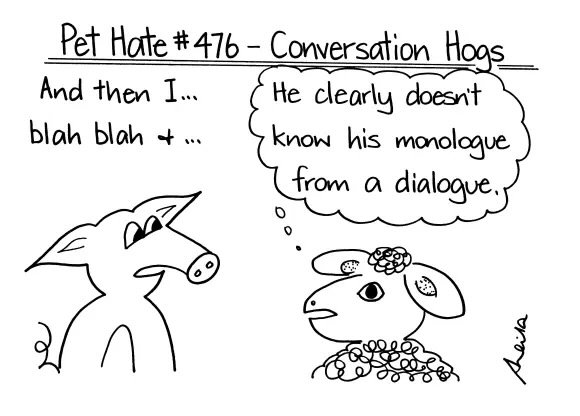106. Pay attention to your talking time
Let’s say you’re having a conversation with someone you just met. How much of the time do you think you should talk vs. listen if you want your conversational partner to like you? How about if you want them to find you interesting? What if you just want to enjoy the conversation? Well, the results of this study on talking vs. listening time may surprise you.
Data point of the week
If you’re like most people (or at least these study participants), you would guess that:
To be liked, you should talk a little less than your conversational partner (40-45%) and listen more.
To be found interesting, you should talk a little more than your conversational partner (53-57%).
To enjoy the conversation, you should each speak roughly equally.
But, it turns out these guesses were wrong (at least on the first two counts).
For the study, 110 participants were split into conversational pairs and given four questions to respond to. Each participant was assigned to speak 30%, 40%, 50%, 60% or 70% of the time, while their partner made up the difference. For example, in a 30-70% pairing, the first partner was given 30 seconds to respond to the question and the second partner was given 70 seconds.
Contrary to participants’ expectations, there was no differentiation between finding someone likable vs. interesting. Liking and interest were lumped together. In other words, the more we like someone, the more interesting we find them, and the less we like them, the less interesting we find them. So, you don’t have to listen more to be liked or talk more to be interesting.
And, participants rated their conversational partners as more likable and interesting if they spoke 50% or more of the time.
Reflection
I’ll admit, this came as a surprise to me. Sharing talking time equally makes sense, but participants also liked their partners better when they spoke 60% or 70% of the time versus 30% or 40%.
Bottom line, you have to get to know someone in order to like them, and you can’t get to know them unless they share about themselves.
I also wonder if these percentages change over the course of a relationship? Are we open to hearing more from a conversational partner in the initial getting-to-know-you phase of the relationship (which this study studied), but want more conversational balance later on?
My preference is for a 50-50 conversational flow. I like when a conversation goes back-and-forth and hate the feeling of being talked at. Conversation hogs are a pet peeve of mine.
Cartoon by Sheila Hollingworth
As an introvert, it’s often hard to join a conversation unless someone asks a question, or at least pauses to leave space for others to jump in.
I’d assumed other people also preferred conversations with (more or less) equally shared talking time (the false consensus effect in action). After all, Google had identified this as a key factor that set high performing teams apart—each team member contributed roughly equally.
But when I talked to my partner—also an introvert—about her preferences, she said she enjoys conversations where the other person speaks more.
Some people may like to talk more, and others listen more. Regardless, it’s important to be aware of your own talking time and how engaged the other person is in the conversation. If they’re checking out, maybe it’s time to invite them to talk.
Connection Skill & Action Step: Pay attention to your talking time.
This connection skill involves paying attention to your talking time when you’re in conversation. What percentage of the time are you talking vs. listening? If you’re not sure about your conversational partner(s) preferences, try to share talking time roughly equally.
If you tend to be more of a talker, practice pausing and inviting the other person/people into the conversation by asking questions and listening.
If you’re more of a listener, practice sharing more about yourself. Has the other person said something you can relate to? Can you elaborate a little more, or go a little deeper on a topic?
In the thick of conversation, it can be hard to be self-aware about our talking time. Maybe there’s an app for that? I couldn’t find anything that tracks each person’s talking time during in-person conversations, but here are some to try out:
Time to Talk breaks down talking time by (perceived) gender during in-person meetings and conversations.
Participation Tracker for Zoom tracks the talking time of each meeting participant, and Talk Time does the same for Google Meet.
Questions to reflect on or to spark conversation. Please share your responses in the comments—I’m REALLY curious!
What’s your conversational preference? Do you like conversations where each person talks and listens roughly the same amount (a 50-50 conversational flow)? Or would you prefer to speak more, or listen more?
Talk about dominating the conversation!


